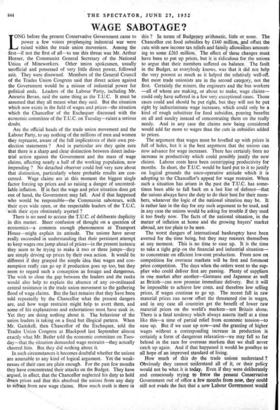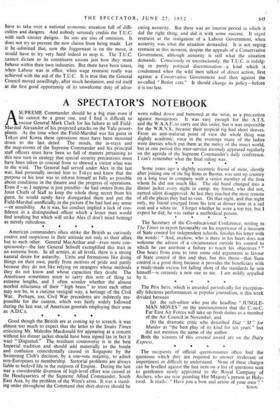WAGE SABOTAGE?
LONG before the present Conservative Government came to power a few voices prophesying industrial war were raised within the trade union movement. Among the - first—if not the first of all—to use this threat was Mr. Arthur Horner, the Communist General Secretary of the National Union of Mineworkers. Other union spokesmen, usually unofficial and possessed of very little direct power, followed suit. They were disowned. Members of the General Council of the Trades Union Congress said that direct action against the Government would be a misuse of industrial power for political ends. Leaders of the Labour Tarty, including Mr. Aneurin Bevan, said the same thing as the T.U.C. It must be assumed that they all meant what they said. But the situation which now exists in the field of wages and prices—the situation which the Chancellor of the Exchequer discussed with the economic committee of the T.U.C. on Tuesday—raises a serious doubt.
Are the official heads of the trade union movement and the Labour Party, to say nothing of the millions of men and women they represent, aware of the full implications of their -own pre- election statements ? And in particular are they quite sure that there is a sharp and clear distinction between direct indus- trial action against the Government and the mass of wage claims, affecting nearly a half of the working population, now impending ? No detached observer could feel very sure about that distinction, particularly where probable results are con- cerned. Wage claims are at this moment the biggest single factor forcing up prices and so raising a danger of uncontrol- lable inflation. If in fact the wage and price situation does get out of hand, the Government may fall. And if that happened who would be responsible—the Communist saboteurs, with their eyes wide open, or the respectable leaders of the T.U.C. "with their eyes obstinately alerted ?
There is no need to accuse the T.U.C. of deliberate duplicity in this matter. Sheer confusion of thought on a question of economics—a common enough phenomenon at Transport House—might explain its attitude. The unions have never really succeeded in understanding that their persistent attempt to keep wages one jump ahead of prices—in the present instance they seem to be trying to make it two or three jumps—they are simply driving up prices by their own action. It would be different if they grasped the simple idea that wages and con- sumption really can go up if production goes up too, but they seem -to regard such a conception as foreign and dangerous. The wish to close the gap between the leaders and the ranks would also help to explain the absence of any co-ordinated central resistance in the trade union movement to the gathering flood of wage claims. But the fact remains that they have been told repeatedly by the Chancellor what the present dangers are, and how wage restraint might help to avert them, and some of his explanations and exhortations must have sunk in. Yet they are doing nothing about it. The behaviour of the union leaders is taking on a fixed but illogical pattern. When Mr. Gaitskell, then Chancellor of the Exchequer, told the Trades Union Congress at Blackpool last September alinost exactly what Mr. Butler told the economic committee on Tues- day—that the situation demanded wage restraint—they actually cheered him. But they did nothing about it.
In such circumstances it becomes doubtful whether the unions are amenable to any kind of logical argument. Yet the weak- nesses of their case are plain enough. For the past few months they have concentrated their attacks on the Budget. They have argued, in effect, that the Chancellor neglected his duty to hold down prices and that this absolved the unions from- any duty to refrain from new wage claims. How much truth is there in this ? In. terms of Budgetary arithmetic, little or none. The Chancellor cut food subsidies by £160 million, and offset the cuts with new income tax reliefs and family allow-laces amount: ing to some f..265 million. The effect, of these changes must have been to put up prices, but it is ridiculous for the unions to argue that their members suffered on balance. The fault in the Budget, as everybody knows, was that it did not help the very poorest as much as it helped the relatively Well-off.
But most trade unionists are in the second category, not the first. Certainly, the miners, the engineers and the bus workers —all of whom are making, or about to make, wage claims— could only have suffered in a few very exceptional cases. Those cases could and should be put right, but they will not be put right by indiscriminate wage increases, which could only be a kind of rough substitute for food subsidies, pouring benefits on all and sundry instead of concentrating them on the really needy. And in any case the claims now being considered would add far more to wages than the cuts in subsidies added to prices.
The argument that wages must be levelled up with prices is full of holes, but it is the best argument that the unions can now advance for wage increases. There has certainly been no increase in productivity which could possibly justify the new claims. Labour costs have been outstripping productivity for months. In short, the T.U.C. would be hard put to it to justify on logical grounds the unto-operative attitude which it is adopting to the Chancellor's appeal for wage restraint. When such a situation has arisen in the past the T.U.C. has some- times been able to fall back on a last line of defence—that the unions always have the duty to do their best for their mem- bers, whatever the logic of the national situation may be. It is rather late in the day for any such argument to be used, and in any case the unions would be asking for trouble if they used it too freely now. The facts of the national situation, in the matter of inflation at home and the growing buyers' market abroad, are too plain to be seen.
The worst dangers of international bankruptcy have been averted for the-time being, but they may reassert themselves at any moment. This is no time to ease up. It is the time to take a tight grip on the financial and industrial situation— to concentrate on efficient low-cost production. From now on competition for, overseas markets will be first and foremost price competition. The days when the orders went to the sup- plier who could deliver first are passing. Plenty of suppliers in one market after another—Germans and Japanese as well as British—can now promise immediate delivery. But it will be impossible to achieve low costs, and therefore low selling prices, if wages continue to go up. The recent fall in raw material prices can never offset the threatened rise in wages, and in any case all countries get the benefit of lower raw material prices on the world's markets—not Britain alone: There is a fatal tendency which always asserts itself at a time like this—a time of partial relief from economic tension—to ease up. But if we ease up now—and the granting of higher wages without a corresponding increase in production is certainly a form of dangerous relaxation=we may fall so far behind in the race for overseas markets that we shall never catch up again. And if that happened it would be goodbye to all hope of an improved standard of living.
How much of this do- the trade unions understand ?, Obviously they cannot understand all of it, or their policy would not be what it is today. Even if they were deliberately and consciously trying to force the present Conservative Government ouf of office a few months from now, they could still not evade the fact that a new Labour Government would have to take over a national economic situation full of diffi- =culties and dangers. And nobody seriously credits the T.U.C. with such sinister designs. Its sins are sins of omission. It does not try•to prevent the new claims from being made. Let :it be-admitted that, now the Juggernaut is on the move, it would have to try very hard indeed to stop it. The T.U.C. cannot dictate to its constituent unions just how they must 'behave within their awn industries. But there have been times, when Labour was in office, when wage restraint really was :achieved with the aid of the T.U.C. It is true that the General Council moved unwillingly, after much hesitation, and rid itself at the first good opportunity of its unwelcome duty of advo- eating austerity. But there was an interim period in which it did the right thing, and did it with some success. It urged restraint at the instigation of a Labour Government, when austerity was what the situation demanded. It is not urging restraint at this moment, despite the appeals of a Conservative Government, although austerity is still what the situation demands. Consciously or unconsciously, the T.U.C. is indulg- ing in purely political discrimination—a kind which it condemned when the wild men talked of direct action, first against a Conservative Government and then against the so-called " Butler cuts." It should change its policy—before it is too late.



































 Previous page
Previous page